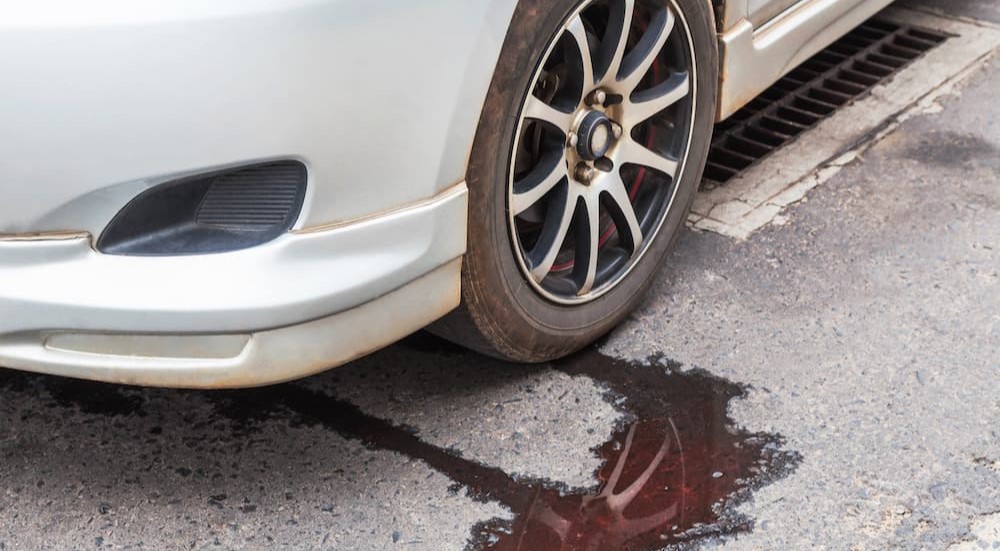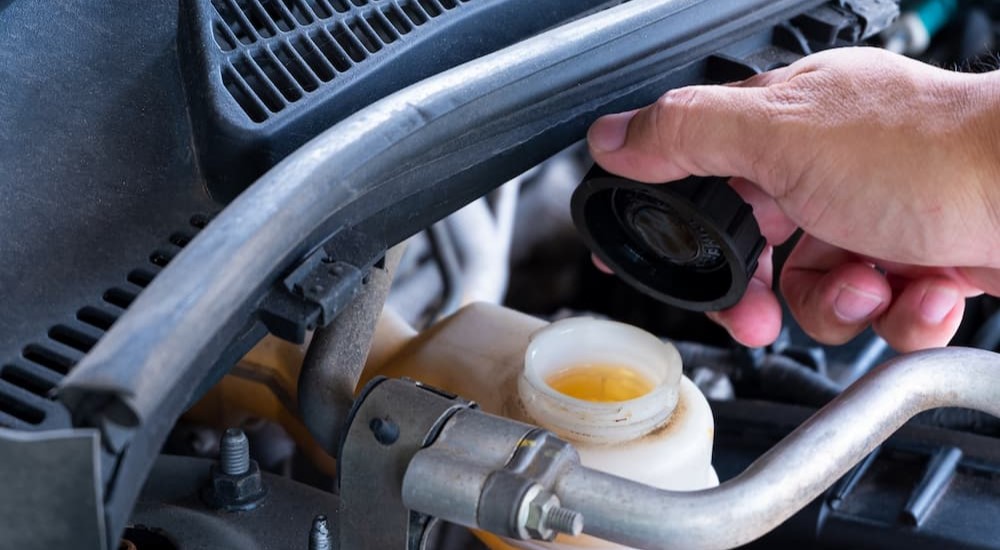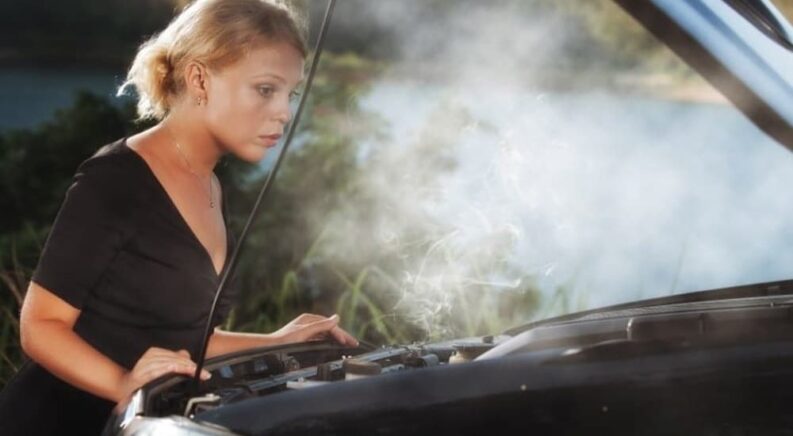There you are, minding your own business, when suddenly you smell something like burning sugar coming from your vehicle, and what appears to be smoke starts to pour up along the sides of your hood. Safe to say, your day just got a whole lot worse—but it’s not the end of the world.
An overheating engine is definitely a problem, and it can ruin an otherwise nice day, but there are things you can do to address the issue quickly and keep it from becoming a disaster. For starters, it’s a good idea to get your car to an auto repair shop or your preferred dealership service center as soon as possible. Beyond that, make sure you pull over immediately and give your car time to cool before checking anything out; having extra coolant and water with you is always a good idea, too.
Different things can cause issues that make your engine overheat, so let’s take a look at some common reasons for overheating and what you need to do when the unexpected occurs.
A Word on Engines and Heat…
One thing that’s important to note before anything else is that your engine is always hot when it’s running. After all, it’s powered by fire and explosions, so heat is a natural part of the process; in fact, the temperature inside your engine is typically thousands of degrees. That’s why you have a cooling system with a radiator, fluid, and water pump to help grab that heat and remove it from your engine. So, if thousands of degrees is normal for your engine, this should tell you how hot it has to become for something to be wrong.

Common Causes of Overheating Engines
Although the cooling system in your engine is relatively simple, there are quite a few things that could go awry and cause it to overheat. Determining the culprit can be pretty easy, however, and here are some of the most common causes you’re likely to run into:
Lack of Coolant
Liquid coolant is essential for your vehicle’s cooling system to function: a water pump moves coolant through your engine (where it heats up), then out of it (where it cools off), dispersing heat from inside your engine to out of your vehicle. If you don’t have enough coolant in this system, then it can’t operate properly. One of the simplest fixes to an overheating engine is making sure there’s enough coolant in the reservoir.
Coolant System Leak
A lack of coolant might only be a symptom of the problem, however, and the bigger issue can be that your vehicle has a leak. Leaks can happen in the reservoir, in any of the tubes that make up your coolant system, and where things connect. If you notice coolant under your vehicle or can tell it’s leaking, then you need to find the leak and fix it. Coolant has a sweet smell to it, which you’ll notice as a burning sweetness if it’s leaking onto the engine—and it’s either green, blue, or orange in color, depending on which coolant you use.
Radiator Problems
Your vehicle’s radiator and fans are responsible for dispersing the heat from your coolant so it can get back into the engine and do its job again. If your radiator isn’t working properly, then everything else can’t do its job. This can be hard to spot and might require removing the radiator to thoroughly check it out.
Water Pump Issues
The water pump is what moves coolant throughout your cooling system. If it’s not working properly, then the rest of the system is basically useless. Dirt can build up within the pump, or it can simply stop working due to mechanical failure. Replacing the water pump is relatively inexpensive and much better than having to replace an engine due to damage from overheating.
Engine Oil Problems
Your motor oil is there to keep the parts in your engine moving smoothly, reducing friction and heat buildup while your car runs. If your engine oil is dirty or old, or you don’t have enough of it, then you can have friction and excess heat within your engine. This is why it’s important to change your oil on a regular basis.
Other Issues and Causes
Other problems can cause your engine to overheat, such as a failure of the thermostat that helps your vehicle track and regulate your engine temperature or problems with the belts and hoses that are part of the engine and cooling system. If you’ve checked for obvious things like leaking coolant or radiator problems without finding the cause, then it’s time to look at some other potential issues that are easy to overlook.

What to Do When Your Engine Overheats
Your response when your engine overheats is crucial and can mean the difference between a minor problem and a much bigger issue. The way to handle it is simple:
Pull Over Quickly But Safely
The first thing you should do is pull over to the side of the road as quickly and safely as you possibly can. Don’t do something dangerous that can cause a crash or pull over if there’s nowhere to safely do so, but don’t keep driving if you can stop. Once you pull over, turn off your engine, and don’t start it again for a while.
Up Your Heat, Down Your Windows
If you can’t get pulled over quickly, one of the best things you can do is turn on the heat inside your vehicle. Your heater actually works by pulling heat from your engine and blowing it into your cabin, so turning on your heater can help your cooling system with some extra support. You could also open your car windows to help vent this heat out, helping to improve cooling.
Do NOT Open the Hood Right Away
You should absolutely never open your car’s hood right away. There’s a lot of heat under there, and it’s likely that the coolant under the hood has become incredibly hot and potentially pressurized. Wait at least 15 minutes—though a half hour is a safer bet—before opening the hood and checking your engine. You can keep an eye on the temperature gauge with your other meters to see when it drops back down from HOT to COOL; you might need to have the key in the “on” or “accessory” position for the temp gauge to function, depending on your vehicle. Just be careful not to start your engine if you need to do so.
Get Your Vehicle to an Auto Shop ASAP
Unless you’re certain about the cause of your engine overheating and know you can fix it yourself, you should get it to an auto shop as soon as possible. If the heat comes down and you’re able to start the engine safely, then you might be able to drive it to a shop—if one is near you—and have it serviced. On the other hand, if it immediately overheats again when you restart the engine, then it’s time to have it towed.

Keep Your Car in the Best Shape Possible
An overheating engine is not a good thing, but it’s also not as bad as what can happen if you ignore the problem and keep driving while overheating. Your engine is designed to handle a significant amount of heat, but it’s not indestructible; enough heat can cause parts of your engine to degrade or crack. If ignored, overheating can result in needing to completely rebuild or replace your engine, which is going to cost a lot more time and money than a simple fix for a coolant leak or new water pump.
Plenty of minor things can cause overheating, which is pretty easy to repair in your driveway or garage. If you can’t find the problem, however, then it’s best to let an expert handle it and ensure your vehicle isn’t about to catch fire or self-destruct.

